(English Version Underneath)
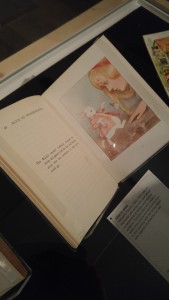 이상한 나라의 앨리스, 어렸을 때 한번 읽어본 책, 또는 루이스 캐롤이 지은 어린이 책으로 많은 사람들이 알고 있다. 특히 개인적으로는 초등학생 이였을때, 그리고 또 고등학교를 다니면서, 심지어 지금까지도 앨리스의 이상한 나라에서의 이야기는 저자가 항상 품고 다니며 즐겨 읽고 좋아하는 책이다. 어린이 책을 왜 지금까지 읽고 있는지 많은 사람들이 묻겠지만, 사람들이 모르는 것은 이상한 나라의 앨리스의 저자, 루이스 캐롤 (본명 : 찰스 도지슨)은 원래 영국 옥스퍼드의 수학자이며 논리학자인 점이다. 그래서 앨리스의 이야기를 자세히 파헤쳐 보면 많은 수학적 내용이 함축 되어 있고, 특히 논리에 관한 장난과 말장난의 완벽한 집합체라고 볼 수 있다. 수학을 공부하는 나에게는 앨리스가 이상한 나라를 탐험하며 느낀 고민들과 생각을 논리적인 오류와 수학적, 언어적 장난으로 표현한 아름다운 문학작품이자 수/논리 작품으로 다가온다. 대영 도서관에서 이 작품의 150주년 기념 특별 전시관에 갔다온 기념으로 그에 이번에는 앨리스의 자유분방함을 수학이라는 학문에 접목하여 한번 적어보려고 한다. 어떻게 우리 수학도들은 이렇게 우리 자신이 만든 세계 안에서 혼자 여행하다가 나올 수 있는지에 관하여, 앨리스의 말도 안
이상한 나라의 앨리스, 어렸을 때 한번 읽어본 책, 또는 루이스 캐롤이 지은 어린이 책으로 많은 사람들이 알고 있다. 특히 개인적으로는 초등학생 이였을때, 그리고 또 고등학교를 다니면서, 심지어 지금까지도 앨리스의 이상한 나라에서의 이야기는 저자가 항상 품고 다니며 즐겨 읽고 좋아하는 책이다. 어린이 책을 왜 지금까지 읽고 있는지 많은 사람들이 묻겠지만, 사람들이 모르는 것은 이상한 나라의 앨리스의 저자, 루이스 캐롤 (본명 : 찰스 도지슨)은 원래 영국 옥스퍼드의 수학자이며 논리학자인 점이다. 그래서 앨리스의 이야기를 자세히 파헤쳐 보면 많은 수학적 내용이 함축 되어 있고, 특히 논리에 관한 장난과 말장난의 완벽한 집합체라고 볼 수 있다. 수학을 공부하는 나에게는 앨리스가 이상한 나라를 탐험하며 느낀 고민들과 생각을 논리적인 오류와 수학적, 언어적 장난으로 표현한 아름다운 문학작품이자 수/논리 작품으로 다가온다. 대영 도서관에서 이 작품의 150주년 기념 특별 전시관에 갔다온 기념으로 그에 이번에는 앨리스의 자유분방함을 수학이라는 학문에 접목하여 한번 적어보려고 한다. 어떻게 우리 수학도들은 이렇게 우리 자신이 만든 세계 안에서 혼자 여행하다가 나올 수 있는지에 관하여, 앨리스의 말도 안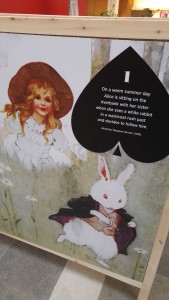 되는 고민들이 어찌하여 앨리스 자신한테는 그리고 그 이상한 나라 안에서는 흐트러짐 없이 이어질 수 있는지, 앨리스의 고민으로 부터 수학의 성격을 이 글에서 분석해본다.
되는 고민들이 어찌하여 앨리스 자신한테는 그리고 그 이상한 나라 안에서는 흐트러짐 없이 이어질 수 있는지, 앨리스의 고민으로 부터 수학의 성격을 이 글에서 분석해본다.
수학에 대한 두려움과 거리낌은 학교를 다니는 학생들에게 많이 존재한다. 문제 풀이와 많은 공식들, 그리고 계산에서의 정확도가 중요하기에 많은 젊은 학생들에게는 수학은 그저 기계적인 학문이 전부일 수 있다. 저자는 끝없는 선행학습과 문제집들로부터 보이지 않는 수학의 묘미를 한번 표현 해보고 싶다. 수학이라는 학문은 지난 번 글에서도 표현했듯이 완변한 거짓말이기에, 이 세상에서 제일 ‘말이 되는‘ 학문이며 사는 방식으로 볼 수 있다. 완변한 토론, 싸움 없는 설득, 함축성과 추상성이 완벽히 정리된 삶 등을 추구함과 동시에 직접 살아가고 있는 ‘수학도‘라는 사람의 성격이라는 의문의 그림자에 빛을 밝혀보도록 하자.
앨리스는 자기 언니가 읽는 책에 그림과 대화문이 없는 점에 관해서 지겨움을 느끼고 졸리기 시작한다. 이처럼 수학도들은 재미를 추구하는, 글 뿐만 아니라 여러 관점으로 설명하기를 좋아하고 화려하고 어린 사람들이라고 비유해본다. 서서히 잠든 앨리스가 환상의 나라에서 ‘말도 안되는‘ 일들을 연속적으로 겪는다. 계속된 non-sequitur(논리가 따라가지 않는다 – 라틴어) 속에서 앨리스는 점점 불가능이라는 개념의 범위가 줄어든다고 말한다. 그렇다. 우리 수학도들에게는 모든 것이 가능하다. 가끔씩은 거의 신의 영감 없이는 생각해 내지 못할 일들과 관계들이 우리 인간이 만든 제일 인위적인 학문 안에서 만들어지고, 차마 거부 할 수 없는 간단한 ‘진리‘로 부터 그 결과에 이를 수 있게 된다. 이 ‘말도 안되는‘ 세상 속에서 많은 결정에 놓이게 된 앨리스는 양쪽 방향 모두 생각하는 모습을 볼 수 있다. 수학이라는 학문은 이처럼 일방향적인 것이 아니라는 것을 강조하고 싶다.. “만약 이것을 마시고 줄어든 다면 문 밑을 기어서 정원으로 들어갈 수 있어, 만약 마시고 커진다면 책상에 놓인 열쇠를 잡아 정원에 들어갈 수 있어, 어찌 되었든 나는 정원에 갈 수 있으니까 상관없어, 그냥 마실꺼야” 분석, 순서, 그리고 생각을 통해 자기 세상 안에서의 자신만의 결론에 이르게 도와주는 논리의 학문이다. 수학이라는 학문은 이토록 발랄하고, ‘완벽하고‘, 세련됐다.
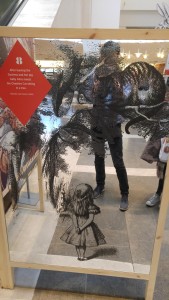 하지만 수학이라는 것이 항상 인간적인 것은 아니다. 앨리스의 탐험에서 많이 표현되었듯이 개인의 논리를 주장하기 시작하면 갈등이 빚어질 수 있다. 진리라는 것이 객관적인 것이 아니라, 자기 자신이 믿는 것이라고 주관적으로 정의하는 순간 수학에서 벗어나 갑자기 논리적 오류를 범하게 되는 불안한 공간으로 들어갈 수 있다. 이를 이용한 논리 문제는 수도 없이 많다. 객관적인 상황에서의 논리가 우리도 모르게 주관적인 논리로 변하면서 가끔 우리는 말이 안되는 것을 믿게 될 수도 있다. 그렇기에 수학이라는 학문은 깨어있는 사람이 되도록 도와주고 다듬어준다. 자기 자신의 믿음을 진리라고 생각하는 것이 잘못된 것은 아니다, 아니, 아주 중요하다. 진리라 믿기에 그렇게 믿고 행동하는 것이기에 잘못을 따질 수 있는 것도 아니다. 다만, 가끔 나무를 떠나 숲을 보며 열린 마음을 갖도록 항상 상기 시켜 주는 것이 수학의 사회성이다.
하지만 수학이라는 것이 항상 인간적인 것은 아니다. 앨리스의 탐험에서 많이 표현되었듯이 개인의 논리를 주장하기 시작하면 갈등이 빚어질 수 있다. 진리라는 것이 객관적인 것이 아니라, 자기 자신이 믿는 것이라고 주관적으로 정의하는 순간 수학에서 벗어나 갑자기 논리적 오류를 범하게 되는 불안한 공간으로 들어갈 수 있다. 이를 이용한 논리 문제는 수도 없이 많다. 객관적인 상황에서의 논리가 우리도 모르게 주관적인 논리로 변하면서 가끔 우리는 말이 안되는 것을 믿게 될 수도 있다. 그렇기에 수학이라는 학문은 깨어있는 사람이 되도록 도와주고 다듬어준다. 자기 자신의 믿음을 진리라고 생각하는 것이 잘못된 것은 아니다, 아니, 아주 중요하다. 진리라 믿기에 그렇게 믿고 행동하는 것이기에 잘못을 따질 수 있는 것도 아니다. 다만, 가끔 나무를 떠나 숲을 보며 열린 마음을 갖도록 항상 상기 시켜 주는 것이 수학의 사회성이다.
수학의 완벽함에서 나오는 문제점을 하나 더 나열해 보자면, 아마 수학의 윤리성일 것이다. 책 후반부, 앨리스의 재판중에, 명언이 하나 나온다. “Sentence first, Verdict afterwards!” 수학적으로 보면 딱히 문제될 것이 없어 보인다. 많은 수학도들이 먼저 Ansatz(가설풀이) 또는 예상된 결론은 먼저 만들고 그 후에 그 ansatz에 관하여 분석을 해서 완벽한 결론에 이르게 된다. 명제를 먼저 만들고 그 명제를 설득력있게 만드는 증명을 나중에 하는것 과 동등하게 표현 되는 위 예문은 윤리적으로 보았을때는 명백히 비인간적이다. 법정에서의 무죄추정의 원칙에 따라 피고가 명백한 증거로 인한 유죄로 판결이 확정될때까지 무죄로 추정하는 이 원칙은 UN이 정의한 기본 인권 중에 하나이다. 처벌을 주고, 판결을 내린다는 것은 이 인권에 관한 직접적인 침해인 셈이다. 또 다른 예를 보자. 말라리아의 전파에 관한 수학적 모델에서 정의 내릴 수 있는 ‘ basic reproductive number’라는 수식을 분석해보면, 말라리아 전파를 줄이는 방법에는, 모기의 수명을 줄이거나 모기 개체수를 줄이거나, 모기가 무는 횟수를 줄이거나, 사람의 개체수를 줄이거나, 사람의 수명을 줄이거나, 사람이 감염된 기간을 줄여야 한다는 것을 수학적으로 결론 지을수 있다. 이에 2가지가 윤리적으로 문제가 있다. 사람을 살리기 위해 말라리아 전파를 줄이는 것인데, 사람의 개체수를 줄이거나 사람의 수명을 단축시키는 것은 일단 첫 목표인 사람을 살리는 것에 어긋나고, 질병의 전파를 막기 위해 사람을 죽인 다는 것은 윤리적으로 봤을 때도 잘못된 결론이다. 수학도들은 이토록 비인간됨의 희미한 선을 넘지 않도록 조심해야 한다. 수학적 결론은 완벽하다. 말라리아를 줄일 수 있다, 하지만 가끔은 인간으로 돌아와야 된다고 생각한다. 앨리스가 이상한 나라에서 Queen of Hearts의 말도 안되는 비인간적인 결론을 보며 참다 못해 “You’re nothing but a pack of cards!” 하며 잠에서 깨는 것 처럼, 그 완벽하고 이상적인 세계에서 수학도는 자기 속의 인간을 찾을 줄도 알아야 된다고 생각한다.
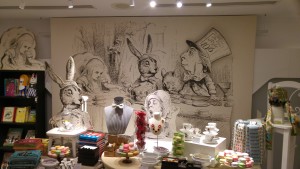 수학자의 제일 중요한 3가지 성격에 관하여 조금 생각을 적어보며 마치려고 한다. 나는 수학자라는 사람이 기본적으로는 첫째, 문제를 발견하고 문제를 더 쉬운 문제로 변화 시켜 문제를 푸는 사람이라고 생각한다. 둘째로는 정직하면서 당당한 사람이라고 생각한다. 마지막으로는 수학의 세계를 탐험하는 사람은 이상주의자라고 생각한다.
수학자의 제일 중요한 3가지 성격에 관하여 조금 생각을 적어보며 마치려고 한다. 나는 수학자라는 사람이 기본적으로는 첫째, 문제를 발견하고 문제를 더 쉬운 문제로 변화 시켜 문제를 푸는 사람이라고 생각한다. 둘째로는 정직하면서 당당한 사람이라고 생각한다. 마지막으로는 수학의 세계를 탐험하는 사람은 이상주의자라고 생각한다.
문제를 발견하고 문제를 변화시키고 문제를 푸는 사람들. 문제라는 말만 들어도 치를 떠는 사람들이 많겠지만, 삶이라는 것이 만약 정말 내 자신을 행복하게 하고 남에게 그 행복을 전해줄 수 있는 그런 시간이라면, 이 세상의 수 많은 문제를 제일 빠르고 쉽게 먼저 이해하고 발견하는 사람들이 수학자라고 생각한다. 그에 수학자들은 이를 간단히 만든다. 복잡한 것을 좋아하는 사람은 없으니까.. 수학은 이토록 먼저 관찰, 발견, 이해, 그리고 간단함을 가르쳐 준다. 수학에서 추상화 시킨다는 것은 만약 다른 문제가 발견 되었을때 만약 비슷한 성격을 지녔다면, 추상화된 개념속에서 지금까지 알려진 해결법을 이용할 수 있기 때문이다. 이렇게 강력한 논리적 도구를 만드는 세상의 장인들이 바로 수학자이다.
수학자는 정직하며 당당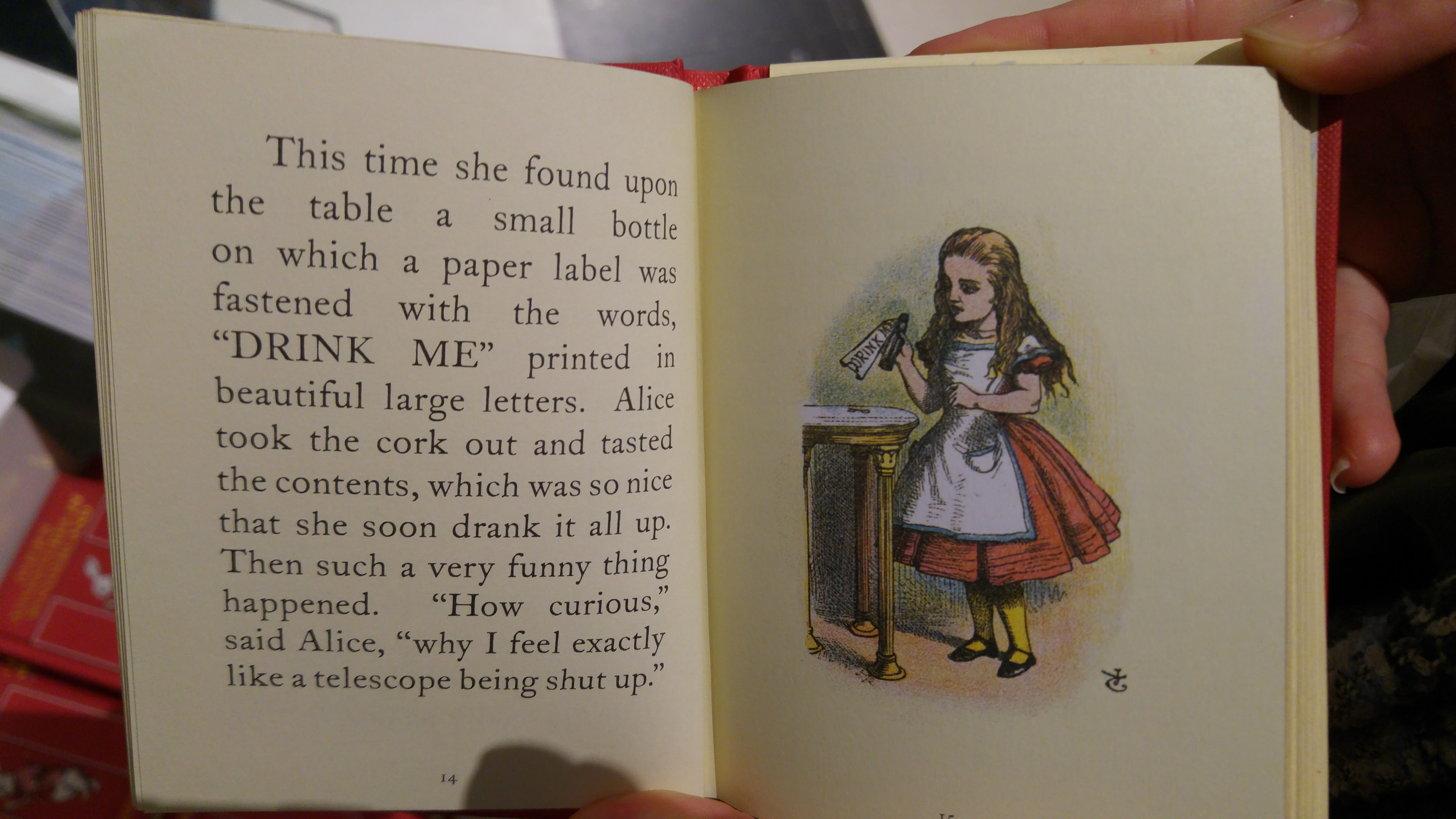 하다. 모든 행동에 있어서 말에 있어서 뒷받침을 하는 사람들이다. 말과 행동에는 이유가 있고, 남이 물었을때 간단 명료하게 이유를 설명할 수 있는 사람들이다. 그렇게 수학자들은 거짓말을 무서워 한다. 거짓말은 새로운 이유를 계속 만들어 나가야 되기 때문에 뒤받힘된 행동에 비해 너무 비안정적이다. 안정된 시스템을 만들어 나가는 우리가 갑자기 chaotic하게 뒷받침이 안되면 이는 수학적으로 분석하기에 일상 생활에서 살아가는데 시간이 너무 오래 걸리기에 거짓말은 꺼리게 되는 것이 자연스럽다. 즉 차라리 정직하고 당당하게 살아가게 만들어 주는 인생의 척도가 수학인 것이다. 인생에 있어서 정직과 당당함 그리고 용기는 수학으로 부터 제일 쉽게 배울 수 있다고 생각한다. 용기와 정직을 제일 쉽게 만들어 주기 때문이다. 영국 의회를 보면 당 대표가 일어서서 주장을 하고 자료와 통계를 통해 뒷받침을 하고, 상대 당대표가 반박을 한다 자료의 오류를 찾든 더 좋은 해결책을 주장하든, 수학의 정직과 당당함이 실생활에 적용되는 케이스다. 차근 차근 서로의 증거와 주장을 순서대로 이해하며 결론에 이르는 안정된 정치가 수학이다.
하다. 모든 행동에 있어서 말에 있어서 뒷받침을 하는 사람들이다. 말과 행동에는 이유가 있고, 남이 물었을때 간단 명료하게 이유를 설명할 수 있는 사람들이다. 그렇게 수학자들은 거짓말을 무서워 한다. 거짓말은 새로운 이유를 계속 만들어 나가야 되기 때문에 뒤받힘된 행동에 비해 너무 비안정적이다. 안정된 시스템을 만들어 나가는 우리가 갑자기 chaotic하게 뒷받침이 안되면 이는 수학적으로 분석하기에 일상 생활에서 살아가는데 시간이 너무 오래 걸리기에 거짓말은 꺼리게 되는 것이 자연스럽다. 즉 차라리 정직하고 당당하게 살아가게 만들어 주는 인생의 척도가 수학인 것이다. 인생에 있어서 정직과 당당함 그리고 용기는 수학으로 부터 제일 쉽게 배울 수 있다고 생각한다. 용기와 정직을 제일 쉽게 만들어 주기 때문이다. 영국 의회를 보면 당 대표가 일어서서 주장을 하고 자료와 통계를 통해 뒷받침을 하고, 상대 당대표가 반박을 한다 자료의 오류를 찾든 더 좋은 해결책을 주장하든, 수학의 정직과 당당함이 실생활에 적용되는 케이스다. 차근 차근 서로의 증거와 주장을 순서대로 이해하며 결론에 이르는 안정된 정치가 수학이다.
 수학을 하는 사람들은 이상주의자들이다. 우리는 어디로 향할지 모르고 가끔 끝이 없어 보일 때도 있다. 앨리스도 그냥 일단 질러본다, 일단 마셔보고, 먹어보고, 걸어 본다. 이 처럼 끝없이 이상한 나라를 헤메고 있을때 항상 이상적으로 끝까지 나아가는 끈질긴 오기의 사람들이 수학자들이다. 또 다른 어린이 책인 나니아 연대기 6권 은의자를 인용하자면,
수학을 하는 사람들은 이상주의자들이다. 우리는 어디로 향할지 모르고 가끔 끝이 없어 보일 때도 있다. 앨리스도 그냥 일단 질러본다, 일단 마셔보고, 먹어보고, 걸어 본다. 이 처럼 끝없이 이상한 나라를 헤메고 있을때 항상 이상적으로 끝까지 나아가는 끈질긴 오기의 사람들이 수학자들이다. 또 다른 어린이 책인 나니아 연대기 6권 은의자를 인용하자면,
“But four babies playing a game can make a playworld which licks your real world hollow. That’s why I’m going to stand by the play-world. I’m on Aslan’s side even if there isn’t any Aslan to lead it. I’m going to live as like a Narnian as I can even if there isn’t any Narnia. So, thanking you kindly for our supper, if these two gentlemen and the young lady are ready, we’re leaving your court at once and setting out in the dark to spend our lives looking for Overland. Not that our lives will be very long, I should think; but that’s a small loss if the world’s as dull a place as you say.”
(The Silver Chair (1953), C.S Lewis)
즉 지금 보다 나은 세상을 수학 속에서 발견 했으면, 또는 발견하기 위하여 그냥 나아가는 사람들이다. 이상의 아름다움을 볼 수 있는 사람들이기 때문이다.
이쯤되면 수학자라는 사람, 또는 수학이라는 것이 참 복잡하고 이상하지만, 그와 동시에 엉뚱하면서 발랄한 생각이라고 생각할 수 있고 나는 그것이 맞는 생각이라고 믿는다. 정말 약간 미친 사람들 또는 이 세상에서 잠깐 벗어나 이상한 나라를 탐험해 보고 싶은 사람들의 학문인 것은 사실이다. 하지만 우리 모두 어렸을 때 한번쯤 우리만의 세계 속에서 자신한테 말이 되도록 상상해보고 살아보지 않았는가? 그것이 바로 수학이다. 우리는 다 수학적인 성격을 지니게 되있다. 그에 나는 사람들이 수학을 무서워하던가 증오함에 비해 잠깐 어린아이의 눈으로 세상을 바라보는 학문이라고 알아보아 주었으면 한다. 나이 어떻든 항상 그 이상한 나라에서의 모험한 기억을 품고 세상을 재밌게 살아갈 수 있고 남에게도 그런 재미를 알려줄 수 있는 사람들이 되도록 독자에게 권하며, 이상한 나라의 앨리스 책의 마지막 부분에 앨리스의 언니가 앨리스의 꿈 이야기를 듣고 회상하며 앨리스의 미래에 관해 생각하는 장면을 인용하며 이 글을 마치고 싶다.
“Lastly, she pictured to herself how this same little sister of hers would, in the after-time, be herself a grown woman; and how she would keep, through all her riper years, the simple and loving heart of her childhood : and how she would gather about her other little children, and make their eyes bright and eager with many a strange tale, perhaps even with the dream of Wonderland of long-ago : and how she would feel with all their simple sorrows, and find a pleasure in all their simple joys, remembering her own child-life, and the happy summer days.” – THE END
(Alice’s Adventures in Wonderland (1865), Lewis Carroll)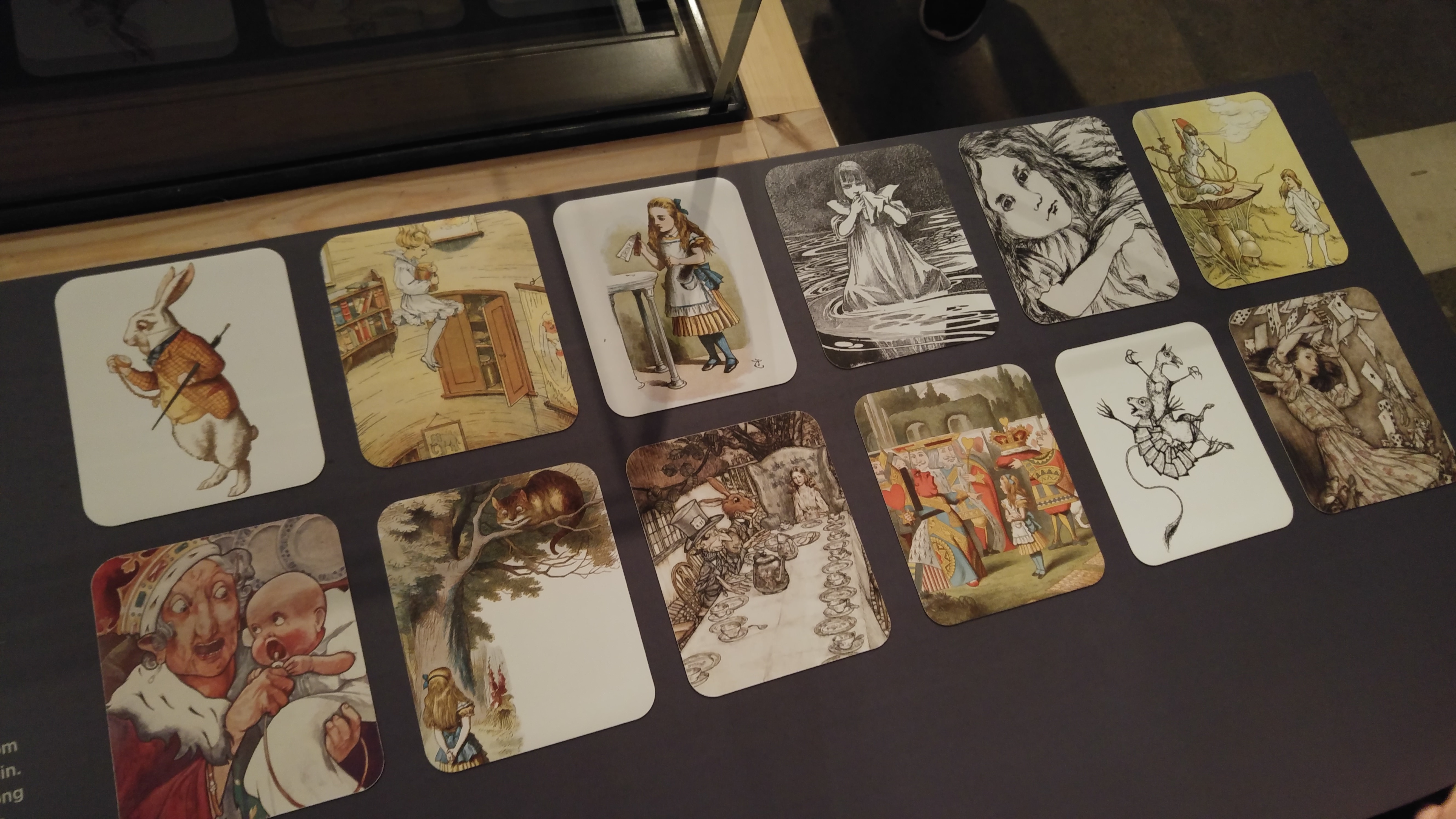
—————————————————————————————–
Alice’s Adventure in Wonderland. Nowadays it’s a very common title with most people either having read it when they were young, or simply knowing it as a popular childrens’ book. Personally the book is more than just a childrens’ book. Always following me around my school years, it has settled itself to be one of my lifelong book companions. It’s natural to ask why a University student might be reading some random childrens’ book hitherto, but I would like to point out that Lewis Carroll, the author of Alice’s Adventure in Wonderland, was an English mathematician and a logician from Oxford University. With that fact behind us, looking thoroughly into Alice’s story exposes many mathematical and logical theories, and it is not an understatement to say that the book is the epitome of mathematical and logical word play and creativity. To the writer, Alice’s contemplation and thoughts whilst exploring Wonderland are well-presented through this beautiful literature, a logical piece about the nonsensical.
With Guildford’s close ties with Lewis Carroll, and having visited the special exhibition in the British Library recently for the 150th anniversary of the publication of Alice’s Adventure in Wonderland, here I present my thoughts on connecting Alice’s free-flowing open mind to an academic subject called mathematics. Let us see how one who studies mathematics can easily journey within the artifical world of logic and relationships of theirs and thereafter connect it with reality; how all the strange and silly pondering of Alice makes complete sense to herself, and stands true within her world of logic. I will attempt to analyse the characteristics of mathematics from Alice’s contemplation in this writing.
The fear and unease surrounding mathematics is largely present within the community of students. Problem solving, numerous theorems, and the accuracy required in calculations pose a discomfort which suggests mathematics only as a ‘mechanical’ subject. The writer would like to express a hidden aspect of mathematics unseen due to the pressure of unending problem solving and studying in advance beyond your curriculum. As I’ve described in the last post, mathematics is a perfect lie, thus it is a subject which makes the most “sense”, and it can be seen as a way of living; A perfect discussion/debate, persuasion without force, the pursuit towards the complete ordering and defining into abstraction and categorisation. Let us shine a light at the mysterious shadow of what it means to be a mathematician.
Alice feels drowsy and sleepy after looking at the book her sister is reading as it has now drawings or conversations. As such, people who explore the field of mathematics pursue entertainment and vivid and various ‘colours’. It is not only by the elegant writing that we like to explain things, but it is also through the many creative and imaginitive ways we try and implement in our explanations that makes us flamboyant and young. As Alice slowly falls asleep, she is bombarded with continuous impossibilities through her adventures in Wonderland. In this hit after hit of non-sequiturs (it does not follow – latin), Alice claims the range of ‘impossibility’ is getting smaller. (“So many out-of-the-way things had happened lately, that Alice had begun to think that very few things indeed were really impossible”) The observation of continuous impossiblities lead to a conclusion of those actually being possible. To mathematicians, there is no such thing as an impossibility. Sometimes there are relationships we describe or certain intuitions that would have not been possible to be conceived without God’s inspiration, but they are all being made in this artificial man-made subject. The observation of nature’s impossibility to be described motivates the subject to be very possible in mimicing nature. Every structure in mathematics is built from simply undeniable truths called axioms and the expansion from those simple truths is what we call mathematics. The expansion is limitless and ever-growing, nothing is impossible under the umbrella of logial deductions from undeniable truths.
Additionally, we see in the novel that Alice is put into situations of choice many times. In these moments, its easy to observe Alice thinking about both sides of the argument and reaching a final conclusion. “Well, I’ll eat it,’ said Alice, ‘and if it makes me grow larger, I can reach the key; and if it makes me grow smaller, I can creep under the door; so either way I’ll get into the garden, and I don’t care which happens!”. Mathematics is similar. It is not a one sided subject, but it is sometimes yielding, sometimes concrete, and sometimes inconclusive, yet through the analysis of order, cases, and logic we reach a complete conclusion within ‘our world’. ‘Our world’ is defined by ourselves. General mathematics may be a universal language, but mathematics to oneself is a very personal space with personal axioms and personal ways of logic to help one reach a conclusion. Like the descriptions above, mathematics is a very youthfully enthusiastic, perfect, and an elegant field of study.
Yet despite the beauty of mathematics, it is also crucial to note that mathematics is not always humane or people-like. As portrayed brilliantly in Alice’s exploration, once somebody starts an argument involving personal logic, conflict can arise. Once we define truth as ‘what one truly believes’, rather than an objective undeniability, we are prone to move out of ‘social’ mathematics and into logical errors. The distinction of personal mathematics and unviersal mathematics is crucial. There are numerous examples of logical games and flaws that describe these situations. Changes from an objective viewpoint to a subjective viewpoint happen in the most subtle way, and we can sometimes be led to believe something that is illogical or even ‘false’. Therefore the complete study of mathematics into acknowledging the generality is crucial in defining logic and it allows the aspiring mathematician to open his/her eyes to be an ‘awoken’ or an ‘omniscient’ academic. It is not ‘wrong’ to believe what you believe is the truth, rather it is very important. The extent of your actions and arguments only arise from what you believe to be true so it is not a thing that can be defined ‘wrong’ or ‘right’. Even this writing’s extent of understanding lies wholly on the beliefs of the writer. What I am trying to say is that, we just have to keep in mind that sometimes we have to leave the tree and also see the forest around you. That is the social aspect of mathematics. It reminds the student to always keep an open mind, and an open eye.
If I have to list another aspect of where the ‘perfectness’ of mathematics can have a problem, it would probably be the ethics of mathematics. Near the end of the book, there is one famous line. “Sentence first, Verdict afterwards!”. Looking at the line in a mathematical point of view, one might not see no wrong in it. It is a common method to create an Ansatz (hypothesised solution/statement) and conclude from it, then through the analysis of the ansatz reaching a proof or a formal derivation. The line in the book which can be thought equivalent to creating a hypothesis/conclusion then making a persuasive proof to back it up, is obviously very inhumane and unethical if we look at it from a human perspective. The notion of presumption of innocence which states that one is considered innocent until proven guilty beyong reasonable doubt is one of the basic human rights defined by the United Nations. To sentence someone and then giving a verdict is a direct invasion to such right.
Lets look at another example on the topic of the ethics of mathematics. An expression called the ‘Basic Reproductive number’ can be derived from the mathematical modelling of the spread of malaria. Analysing the expression, we reach a few conclusions in reducing the spread of malaria. You can reduce the life span of mosquitos, reduce the number of mosquitos, reduce the biting frequency of mosquitos, reduce the number of humans or reduce human life span, or reduce the time of being infected. There are 2 big ethical problems in these conclusions. First of all the model was created to see the ways to reduce malaria, but reaching a conclusion to remove the humans or reduce the life span is counter-intuitive to the goal. And to remove or to kill a human being just to stop a disease from spreading is ethically wrong as well. Therefore it is of high importance that mathematicians and pursuers of mathematics make sure they don’t cross the faint line of mathematical conclusions and being inhumane. The conclusions are always perfect or near perfect, you can reduce the spread of malaria, yet I believe we should always be connected to our human side of being a human even when we are exploring the land of logic and truths. As Alice shouts to the Queen of Hearts for all her inhumane orders and commands, “You’re nothing but a pack of cards!”, let us make sure to find the humanness inside us even within the perfect and ideal state of logic.
I would like to finish the post by writing some thoughts about the 3 most important personality of mathematicians. In my opinion, a mathematician is first of all a problem identifier, reducer and a solver. Secondly he/she is an honest and confident person. And lastly people who explore through the world of mathematics are idealists.
People who identify a problem, who change the problem and solve the problem. There might be people who would shiver at the simple thought of a “problem”, but think about what life means. If life is indeed a time where you can really make yourself happy and content and make others happy as well, one of the key to do so is to overcome an ‘solve’ a problem. The elation you get in beating a hard challenge and the potential happiness the problem you’ve solved can bring to others is immeasurable. If so, I believe mathematicians are very well equipped to be one of the most efficient and fastest problem identifier/solver. We understand and discover problems fast, and make the problems simple cause nobody likes complicated stuff. Mathematics teaches you how to observe, discover from that observation, to understand your discovery, and to finally simplify your understanding. The power of abstraction in mathematics is immense. When we discover something new we can easily categorise with our abstracted system retrieving many known properties for the system already. This implies when mathematicians encounter a problem, we connect it with an abstraction that was made before and learn many things about the problem before we even look into it. If it is already similar to another structure in the same abstract field, it might even just be solved through comparison. The master craftsmen making these extremely powerful logical tool are called mathematicians.
Mathematicians are honest and confident. For every word and action we back it up with concrete evidence. There is reason behind everything, and we are trained to give simple yet strong explanations when someone asks for one. Therefore it can be said that mathematicians are afraid to be dishonest. Creating a lie or not being true to oneself means one has to create new reasons to back the lie up constantly and keep track of it to make it perfect. It is a system very unstable compared to backed up actions. Whilst studying stable systems and stable solutions, when one arrives at a chaotic progression of solutions, we know that the complexity of the analysis becomes too complex for analysis in given time. Therefore in daily life and conversations, lie and dishonesty are discouraged naturally. Following the idea, mathematics beome a spinal structure in life to keep you in check of honesty and confidence. I believe honesty, confidence, and courage in life are best learnt from the study of mathematics. Mathematics forms courage and honesty within oneself and one nurtures that seed planted by the beautiful subject in his/her pursuit of becoming an extraordinary person. Looking at british parliament, we see the speakers and leaders stand up and speak for the party with evidence and statistics to back their claims and to persuade/point to errors each other. This can be seen as the honesty and confidence of mathematics surfacing in real life. The way of how an ordered logical structure of arguments become understandings of each evidence and claims which eventually leads to reaching a formal conclusion is very mathematical. Mathematics is a type of stable politics, and we despise pride and prejudice which blinds our judgement.
People who study maths are idealists. Sometimes we don’t even know where we are heading to, and sometimes there seems to be no end to what we’re doing. However if you look at Alice, she just goes for it. She doesn’t really know whats going to happen, but she just drinks, eats, and walks. I would like to claim that all people who wander in the never-ending strange Wonderland with optimism and resilience and some sort of ideal are all mathematicians. Another childrens’ book describes this point effectively. From the Silver Chair, in the Chronicles of Narnia:
“But four babies playing a game can make a playworld which licks your real world hollow. That’s why I’m going to stand by the play-world. I’m on Aslan’s side even if there isn’t any Aslan to lead it. I’m going to live as like a Narnian as I can even if there isn’t any Narnia. So, thanking you kindly for our supper, if these two gentlemen and the young lady are ready, we’re leaving your court at once and setting out in the dark to spend our lives looking for Overland. Not that our lives will be very long, I should think; but that’s a small loss if the world’s as dull a place as you say.”
(The Silver Chair (1953), C.S Lewis)
Thus if one finds some ideal or ideal world within the world of mathematics, we are people who just drinks, eats and walks to discover and spend our lives to find the interesting out of the bleak. We know how to appreciate and see the beauty of ideals.
By now you would probably think that a mathematician, or mathematics the subject itself might sound complicated and weird. Also you might wonder why I use ‘we’ when I describe mathematicians as if you and I are also mathematicians. This is because we are all mathematicians. You might think all my thoughts above are all very “cute” or youthful and I believe that is the right reaction one might have. Mathematics is genuinely for people all slightly crazy(As the Cheshire cat says “We’re all mad here. I’m mad. You’re mad.”), and for people who would like to explore their own Wonderland. Yet haven’t we all explored our made up world when we were young? That is mathematics. Whatever it was, we are all meant to display mathematical dispositions in our lives. Courage, order, honesty, logic, confidence, exploration, happiness, craziness, and many other humanly abstracted feelings are all what I call mathematics. That is the reason why I would like people to look at mathematics with a eye of a small child imagining and observing rather than with eyes of fear or repulsions. Whatever your age, I would like to strongly encourage readers to be extraordinary people who would always remember their adventures in Wonderlands of their youth and to be people who an share that fun and excitement to other people and young people around you. I end this piece of writing with a quote from the last part of Alice’s Adventures in Wonderland where Alice’s sister talks about her thoughts of Alice and her youthfulness :
“Lastly, she pictured to herself how this same little sister of hers would, in the after-time, be herself a grown woman; and how she would keep, through all her riper years, the simple and loving heart of her childhood : and how she would gather about her other little children, and make their eyes bright and eager with many a strange tale, perhaps even with the dream of Wonderland of long-ago : and how she would feel with all their simple sorrows, and find a pleasure in all their simple joys, remembering her own child-life, and the happy summer days.” – THE END
(Alice’s Adventures in Wonderland (1865), Lewis Carroll)

지훈아~많은 생각들 정리해서 올리느라 애 많이 썼네. 수학도로서 좋은 경험들을 해가고 있는거 같네…긴 글 조금만 줄여주라 ㅋㅋ 이렇게 네 생각과 대학생활을 공유할 수 있어 감사하네…사랑한다..